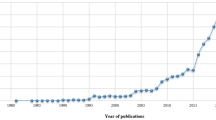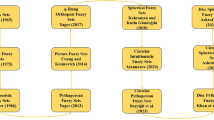Abstract
It is a well-known fact that the most appealing external funding for a project is grant funding. Therefore, evaluation of research proposal task needs an elaborate approach so as not to finance inconvenient projects. It is indispensable to establish a detailed study for submitted research proposals to have a clearer picture of the grant funding candidates. This study has contributed to research proposal evaluation using a multicriteria approach based on interval-valued intuitionistic fuzzy sets. An interval-valued intuitionistic fuzzy preference relation matrix is initially constructed to determine the relative importance of criteria based on pairwise comparisons in the presence of insufficient information about the criteria. The proposed evaluation method for grand funding allocation problem is composed of six main criteria and 24 sub-criteria. A sensitivity analysis is applied to see the robustness of the decision made.









Similar content being viewed by others
References
Atanassov K, Gargov G (1989) Interval valued intuitionistic fuzzy sets. Fuzzy Sets Syst 31(3):343–349
Atanassova L (2008) On interval-valued intuitionistic fuzzy versions of L. Zadeh’s extension principle. In: Atanassov K, Kacprzyk J, Krawczak M, Szmidt (eds) Issues in intuitionistic fuzzy sets and generalized nets, Warsaw, vol 7, pp 13–19
Bloch C, Sørensen MP, Graversen EK, Schneider JW, Schmidt EK, Aagaard K, Mejlgaard N (2014) Developing a methodology to assess the impact of research grant funding: a mixed methods approach. Eval Progr Plan 43:105–117
Chapin PG (2004) Research projects and research proposals. Cambridge University Press, Cambridge
Chen TY, Wang HP, Lu YY (2011) A multicriteria group decision-making approach based on interval-valued intuitionistic fuzzy sets: a comparative perspective. Expert Syst Appl 38(6):7647–7658
Denscombe M (2013) The role of research proposals in business and management education. Int J Manag Educ 11(3):142–149
Fogelholm M, Leppinen S, Auvinen A, Raitanen J, Nuutinen A, Väänänen K (2012) Panel discussion does not improve reliability of peer review for medical research grant proposals. J Clin Epidemiol 65(1):47–52
Galbraith CS, McKinney BC, DeNoble AF, Ehrlich SB (2014) The impact of presentation form, entrepreneurial passion, and perceived preparedness on obtaining grant funding. J Bus Tech Commun 28(2):222–248
Geuna A, Martin BR (2003) University research evaluation and funding: an international comparison. Minerva 41(4):277–304
Hills PV, Dale AJ (1995) Research and technology evaluation in the United Kingdom. Res Eval 5(1):35–44
Hong LC, Fong S (2012) Presenting a research proposal: the examiners’ expectations. Proc Soc Behav Sci 66:537–543
Jacob BA, Lefgren L (2011) The impact of research grant funding on scientific productivity. J Public Econ 95(9):1168–1177
Kahraman C, Ruan D, Dogan I (2003) Fuzzy group decision-making for facility location selection. Inf Sci 157:135–153
Kasvi JJ, Vartiainen M, Hailikari M (2003) Managing knowledge and knowledge competences in projects and project organisations. Int J Proj Manag 21(8):571–582
Kim S, Koo J, Lee YH (1999) Infrastructure and production efficiency: an analysis on the Korean manufacturing industry. Contemp Econ Policy 17(3):390–400
Kondolf GM (1995) Five elements for effective evaluation of stream restoration. Restor Ecol 3(2):133–136
Li DF (2011) Extension principles for interval-valued intuitionistic fuzzy sets and algebraic operations. Fuzzy Optim Decis Mak 10(1):45–58
Lichtenberg FR (1987) The effect of government funding on private industrial research and development: a re-assessment. J Ind Econ 36:97–104
Iutcovich JM, Iutcovich M (1987) The politics of evaluation research. A case study of community development block grant funding for human services. Eval Progr Plan 10(1):71–81
Ogden TE, Goldberg IA (eds) (2002) Research proposals: a guide to success. Academic Press, San Diego
Oral M, Kettani O, Ç\(\imath \)nar Ü (2001) Project evaluation and selection in a network of collaboration: a consensual disaggregation multi-criterion approach. Eur J Oper Res 130(2):332–346
Punch KF (2006) Developing effective research proposals. SAGE, London
Santos-Vijande ML, Álvarez-González LI (2007) Innovativeness and organizational innovation in total quality oriented firms: the moderating role of market turbulence. Technovation 27(9):514–532
Silyn-Roberts H (2013) A research proposal. In: Silyn-Roberts H (ed) Writing for science and engineering, 2nd edn. Elsevier, Oxford, pp 75–82. doi:10.1016/B978-0-08-098285-4.00005-4
Sugeno M, Kang GT (1986) Fuzzy modelling and control of multilayer incinerator. Fuzzy Sets Syst 18(3):329–345
Tang SL (2003) Economic feasibility of projects: managerial and engineering practice. Chinese University Press, Hong Kong
Thomas D, Nedeva M (2012) Characterizing researchers to study research funding agency impacts: the case of the European Research Council’s Starting Grants. Res Eval 21(4):257–269
Ward D (2010) Effective grants management. Jones & Bartlett Publishers, Sudbury
Willcocks L, Lester S (1991) Information systems investments: evaluation at the feasibility stage of projects. Technovation 11(5):283–302
Xu Z (2010) A method based on distance measure for interval-valued intuitionistic fuzzy group decision making. Inf Sci 180(1):181–190
Xu ZS, Chen J (2007) Approach to group decision making based on interval valued intuitionistic judgment matrices. Syst Eng Theory Pract 27(4):126–133
Zimmermann HJ (1992) Fuzzy set theory and its applications. Kluwer Academic Publishers, Dordrecht (second revised edition)
Zhu JJ, Wang HH, Ye C, Lang Q (2014) Project evaluation method using non-formatted text information based on multi-granular linguistic labels. Inf Fusion 24:93–107
Author information
Authors and Affiliations
Corresponding author
Ethics declarations
Conflict of interest
The authors declare that they have no conflict of interest.
Additional information
Communicated by V. Loia.
Rights and permissions
About this article
Cite this article
Oztaysi, B., Onar, S.C., Goztepe, K. et al. Evaluation of research proposals for grant funding using interval-valued intuitionistic fuzzy sets. Soft Comput 21, 1203–1218 (2017). https://doi.org/10.1007/s00500-015-1853-8
Published:
Issue Date:
DOI: https://doi.org/10.1007/s00500-015-1853-8




